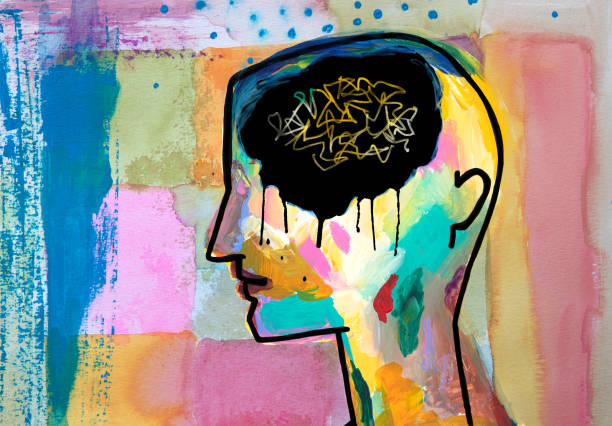
Mental health concept - person's head with chaotic thought pattern, depression, sadness, anxiety. Mixed media painting. My own work.
Understanding Depression in Children and Adolescents
Depression in children and adolescents is a serious issue that can have long-term impacts on their mental and emotional wellbeing. Not only is it important to be aware of the signs of depression, but it is also important to know how to ask for help if you or someone you know is experiencing depression. In this article, we will explore what depression is and how to ask for help with it.
What Is Depression?
Depression is a mood disorder that causes persistent feelings of sadness, hopelessness, worthlessness, and a lack of interest in activities once found enjoyable. Depression in children and adolescents exhibits similar symptoms as in adults, but they may also have difficulty expressing how they feel. If you notice changes in behavior or signs of sadness that last for more than two weeks in your child, consider talking to a mental health professional.
Asking for help can be a challenge for both children and adolescents with depression. Encourage your child to open up about their feelings and let them know they’re not alone. Let them understand that depression is a treatable illness through therapy, medication, or a combination of both. If your child is resistant to speaking to a professional alone, accompany them, and offer support. It’s also essential to provide emotional support by talking to your child, practicing active listening, and helping them manage their lifestyle by engaging them in social activities and healthy eating. Always remember that depression is a serious issue that requires proper medical attention. It’s okay to ask for help.
Pro Tip: Reducing digital screens and increasing outdoor walks can help lift mood and increase the release of endorphins in depressed adolescents.
Causes of Depression in Children and Adolescents
Depression in children and adolescents can be caused by a variety of factors, including biological, environmental, and psychological factors. Biological factors, such as genetics, brain chemistry, or hormonal imbalances, can predispose some children to depression. Environmental factors, such as stress, trauma, or family conflict, can also play a significant role in triggering depression. Psychological factors, such as negative thinking patterns, low self-esteem, or feeling overwhelmed, can also contribute to depression in children and adolescents.
It is important to recognize the signs and symptoms of depression in children and adolescents and to seek help if needed. If your child is experiencing persistent feelings of sadness, hopelessness, or worthlessness or has lost interest in activities they previously enjoyed, it may be a sign of depression. Encourage your child to talk about their feelings and seek professional help if necessary. Remember that depression is a treatable condition and that seeking help is a sign of courage, not weakness.
Pro tip: Listen actively when your child talks to you about their feelings and avoid minimizing their experiences. Remember that their emotional pain is real and valid, and they need your support and understanding.
Symptoms Of Depression In Children and Adolescents
Depression in children and adolescents can be difficult to identify as it often presents differently than it does in adults. Here are the common symptoms to look out for:
- Persistent feelings of sadness, hopelessness, or worthlessness
- Irritability or anger
- Loss of interest in activities once enjoyed
- Changes in appetite or weight
- Sleep disturbances
- Fatigue or lack of energy
- Difficulty concentrating or making decisions
- Physical complaints such as headaches or stomach aches
- Thoughts of suicide or self-harm
If your child is experiencing any of these symptoms, it is important to seek help from a mental health professional. Encourage your child to talk about their feelings and offer support and understanding. Remember that depression is a treatable illness, and with proper support and treatment, your child can overcome it. Pro tip: Prioritize your child’s mental health just as you would their physical health.
Why It’s Important To Ask For Help With Depression
Depression is a serious issue that should not be ignored, particularly in children and adolescents. Feeling overwhelmed by sadness and low self-esteem can lead to difficulties in school, relationships, and even their physical health. Thankfully, there are ways to help with depression, and it starts with reaching out for support and guidance. Below, we’ll discuss why it’s important to ask for help with depression and how to do so.
Stigma Around Depression
Depression is a common mental health disorder that affects millions of people worldwide. Unfortunately, there is still a significant stigma around depression, which prevents many individuals, including children and adolescents, from asking for help. Asking for help is crucial for managing depression and reducing the risk of long-term health problems.
Parents and caregivers can help children and adolescents with depression by creating a supportive environment where they can express their feelings and seek help without fear of judgment. Additionally, healthcare professionals, school counselors, and mental health specialists can provide valuable resources and support to young individuals with depression. If you or someone you know is struggling with depression, it’s essential to ask for help and seek treatment. Don’t let the stigma around depression prevent you from getting the support you need to manage your mental health.
Pro tip: Take small steps in seeking help, such as talking to a trusted friend or family member, and gradually work towards seeking professional support. Remember, seeking help is a sign of strength, not weakness.

Consequences Of Untreated Depression
Untreated depression can have severe consequences on an individual’s mental health, leading to a range of negative outcomes.
Some of these consequences include:
- Higher risk of suicide: Individuals with untreated depression are more likely to engage in suicidal ideation and behaviors due to the intensity of their emotional distress.
- Relationship difficulties: Depression can lead to a lack of interest in socializing and maintaining personal relationships, which can cause feelings of isolation and loneliness.
- Physical health complications: Untreated depression can lead to changes in appetite, weight, and sleeping patterns, which can cause physical health issues.
If you or a loved one is experiencing depression, it’s essential to seek help from a healthcare professional. For children and adolescents, it’s important to ask for help from trusted adults like parents, teachers, or counselors, who can provide support and connect them to necessary resources. Pro tip: Seeking help is a sign of strength and resilience, and it’s essential to prioritize your mental health.
Benefits Of Seeking Help For Depression
Depression is a mental health condition that affects millions of people, including children and adolescents. Seeking help for depression is essential to one’s mental and emotional wellbeing. Here are some benefits of asking for help with depression:
- Professional Guidance: Seeking help from a mental health professional can provide you with the guidance and tools necessary to manage your depression symptoms. They can also help you identify the root causes of your depression and develop coping strategies.
- Medication Management: A mental health professional can prescribe antidepressant medication to help manage the symptoms of depression, such as sadness, loss of interest or energy, or difficulty sleeping.
- Emotional Support: Seeking help for depression provides emotional support from friends, family, and mental health professionals. They can help you navigate complex emotions, and provide a safe space to express your feelings.
If you or someone you know is struggling with depression, know that it’s okay to ask for help. Speak to your doctor or a mental health professional to begin the journey towards healing and recovery.
How To Ask For Help With Depression
It can be hard to ask for help, especially when dealing with depression. Depression is a real and serious mental health issue that can affect children and adolescents in unique ways. To ensure the best mental health of our children, we must make sure they know how to ask for help with depression. This article will discuss the steps to take when asking for help with depression.
Talking To a Trusted Adult
Asking for help with depression can be a difficult and overwhelming task, but it’s crucial to know that you are not alone and that support is available. Speaking to a trusted adult is an important step in managing depression in children and adolescents.
Here are some tips on how to approach the conversation:
- Identify the trusted adult you feel comfortable talking to about your feelings, such as a parent, teacher, or counselor.
- Find a private and quiet space where you can have an uninterrupted conversation.
- Be honest about what you are feeling, and use “I” statements to avoid placing blame on others.
- Explain that you need their help and support in seeking a mental health professional.
Remember that seeking help is a sign of strength, and there are people who care and want to support you on your journey to healing.
Pro tip: If you don’t feel comfortable speaking to someone in your immediate circle, consider reaching out to a confidential helpline or a mental health professional for guidance and support.
Reaching Out To a Mental Health Professional
Depression in children and adolescents can have severe and long-lasting effects if left untreated. If you are a caregiver or a young person struggling with depression, it is crucial to know how to ask for help from a mental health professional. Here are some steps to follow:
- Acknowledge the problem: Recognizing the signs and symptoms of depression is the first step towards seeking help. These can include feelings of sadness, hopelessness, and irritability, changes in sleeping patterns, appetite, and energy levels, and difficulty concentrating or making decisions.
- Reach out to a trusted adult: This can be a parent, teacher, coach, or any other adult who you feel comfortable talking to. Explain your concerns and ask for their support in finding a mental health professional.
- Research mental health professionals: Look for licensed therapists or counselors in your area who specialize in working with children and adolescents. You can ask for recommendations from your healthcare provider, school counselor, or local mental health clinic.
- Make an appointment: Contact the mental health professional you have selected and schedule an initial appointment. Be prepared to share your symptoms, concerns, and any relevant details about your medical history and life circumstances.
Remember that seeking help is a sign of strength, and you are not alone in your struggles. With the right support, treatment, and self-care, you can overcome depression and lead a fulfilling life.
Calling a Crisis Helpline
Calling a crisis helpline can be a life-saving resource when dealing with depression or other mental health issues in children and adolescents. It’s essential to know how to ask for help effectively and what to expect during the call.
Here are some tips to help you when calling a crisis helpline:
- Be prepared to share your name, age, and current location.
- Explain your situation briefly and honestly.
- Answer any questions the crisis counselor may ask, such as whether you feel safe and have thoughts of suicide.
- Listen to the counselor’s advice and follow their instructions.
Remember that calling a crisis helpline is a brave and responsible step towards healing and recovery.
Support For Parents and Caregivers
Parents and caregivers are often the first line of defense for children and adolescents struggling with depression. While it can be difficult to recognize the signs of depression and help children find the courage to ask for help, there are many resources available to support parents and caregivers in the journey of helping their children to better mental health.
Ways To Support a Depressed Child or Adolescent
If you suspect that your child or adolescent is struggling with depression, here are some ways you can support them:
- Start a conversation: It can be challenging to talk about depression, but starting a conversation is the first step. Let your child know that you’re there for them and ask how you can help.
- Listen without judgment: Encourage your child to share their thoughts and feelings without interrupting or judging them. Provide a safe space for them to express themselves honestly.
- Seek professional help: Depression is a serious condition that requires professional treatment. Consider talking to a therapist or a psychiatrist to get your child the help they need.
- Encourage self-care: Establish healthy routines and encourage your child to practice self-care. This may include regular exercise, healthy eating, and practicing mindfulness or relaxation techniques.
Remember, it’s essential to take depression seriously and seek help. With the right support, your child can overcome their depression and thrive.

Taking Care of Your Own Mental Health
Taking care of your own mental health is just as important as taking care of your physical health, especially for parents and caregivers of children and adolescents struggling with depression.
Here are some ways to ask for help if you or a loved one is experiencing depression:
- Reach out to a mental health professional: A therapist or counselor can provide guidance, support, and treatment options for depression.
- Talk to a healthcare provider: Your family doctor can assess your symptoms, recommend treatment options, or refer you to a mental health specialist.
- Seek support from loved ones: Talking to trusted friends or family members can help reduce feelings of isolation and provide emotional support.
- Join a support group: Support groups provide a safe environment for individuals struggling with depression to connect with others and share their experiences.
Remember, reaching out for help is a sign of strength, not weakness.
Pro tip: Prioritize self-care by practicing healthy habits, such as exercise, eating nutritious foods, and getting enough sleep.
Resources For Parents and Caregivers
Depression can affect children and adolescents as well as adults, and it’s essential for parents and caregivers to know how to ask for help when they identify the signs and symptoms in their children.
Here are some resources that can offer support to parents and caregivers:
- National Alliance on Mental Illness (NAMI): NAMI is an organization that offers resources and support for those dealing with mental illness. They have a helpline that provides free, confidential support and information to people in need.
- American Academy of Child and Adolescent Psychiatry (AACAP): AACAP is a professional organization that offers resources and support for families dealing with mental health issues in children and adolescents. They have a “Find a Psychiatrist” tool on their website that can help parents and caregivers find a qualified mental health professional in their area.
- Child Mind Institute: The Child Mind Institute is a nonprofit organization that offers mental health resources and support for children and families. They have a comprehensive guide on their website with tips for parents on how to identify and address depression in children and adolescents.
Remember, it’s important to seek help from medical professionals if you suspect your child is experiencing depression. Pro tip: Take any concerns about your child’s mental health seriously and seek treatment from qualified mental health professionals.
Conclusion and Additional Resources
Depression is an increasingly common challenge for children and adolescents. Fortunately, there is help available. This document has discussed the signs, causes, and effects of depression in children and adolescents. It has also offered some guidance on how to ask for help with depression. This conclusion will provide additional resources and mental health services.
Recap of Key Points
In summary, identifying depression in children and adolescents can be challenging, but knowing the signs and seeking help from mental health professionals is crucial. It’s important to create a supportive environment for young people to feel safe and comfortable opening up about their mental health struggles. Encourage open dialogue and listen actively when they talk. Professional help can make a big difference in managing depression symptoms in children and adolescents.
Additional resources that can help you get a better understanding of the topic include parenting blogs, online communities, and mental health support groups. It’s important to stay informed and connected to other people who may be going through similar experiences. Together, we can create a safe and supportive environment that promotes positive mental health outcomes in our children and adolescents.
Pro tip: Early detection and intervention are key to preventing long-term mental health issues in children and adolescents. Don’t be afraid to reach out for help when you or your child need it. Remember, seeking help is a sign of strength, not weakness.
Further Reading and Resources
In conclusion, depression is a complex and serious condition that requires professional help. If you suspect that a child or adolescent in your life may be struggling with depression, it is important to take action and seek assistance from a mental health professional.
Here are some additional resources and articles that you may find useful:
- “How to Talk to Your Child or Teen About Suicide”: provides guidance on having difficult conversations with young people about suicide and mental health.
- “10 Warning Signs of a Mental Health Condition in Children and Teens”: outlines the signs and symptoms of a range of mental health conditions in young people, including depression.
- “Cognitive Behavioral Therapy for Depression in Children and Adolescents”: explains how CBT can be an effective treatment for depression in young people.
Remember, seeking help is a sign of strength, and treating depression early can make a significant difference in a child’s life.
Pro Tip: If you have concerns about your child’s mental health, reach out to a mental health professional in your area for support and guidance. They can provide you with personalized advice and resources to help you and your child navigate this challenging time.










